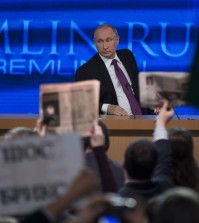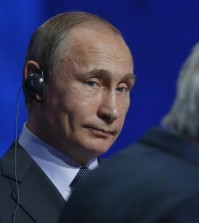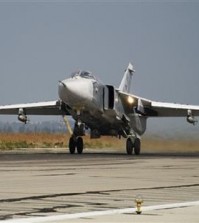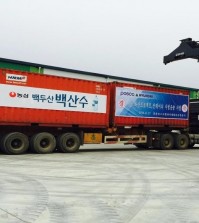- California Assembly OKs highest minimum wage in nation
- S. Korea unveils first graphic cigarette warnings
- US joins with South Korea, Japan in bid to deter North Korea
- LPGA golfer Chun In-gee finally back in action
- S. Korea won’t be top seed in final World Cup qualification round
- US men’s soccer misses 2nd straight Olympics
- US back on track in qualifying with 4-0 win over Guatemala
- High-intensity workout injuries spawn cottage industry
- CDC expands range of Zika mosquitoes into parts of Northeast
- Who knew? ‘The Walking Dead’ is helping families connect
Olympic Village “Inadequate”
Last-minute preparations are well underway
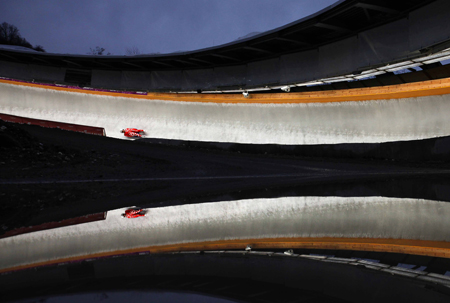
An Austrian athlete, in this Feb. 22, 2013, file photo, practices on a track at the Sanki Sliding Center during the Luge World Cup in Krasnaya Polyana. Korea’s sledding athletes headed straight to the center after arrival to check out the track ahead of the opening of the Sochi Winter Olympics on Friday.
(AP-Yonhap)
By Kwon Ji-youn
Last-minute preparations are well underway as Korean athletes and officials begin arriving in Sochi to warm up for the Winter Games.
A delegation of 46 Korean Olympians arrived at the Black Sea resort town on Sunday following a 13-hour flight, but after a brief break, the sledding athletes headed straight to the Sanki Sliding Center to check out the track and arrange for any unforeseen complications.
Only bobsledder Won Yun-jong has experienced the Sanki track, which has 17 turns and is described as smooth as glass. Athletes who are familiar with the course have described it as “technically solid, but not as fast as Whistler.”
“It’s easier to get down. You’re not going to have a lot of crashes. But the problem is it’s not easy to get down quickly,” bobsledder Steve Holcomb told Reuters on Saturday.
The track, which is nearly two-kilometers long, has three slightly uphill passages in both that run straight and curve to reduce speed and maximize safety. The first of its kind in Russia, the track was designed specifically for international tournaments, and is also built to accommodate women and pairs who will make 16 turns. Bobsleighs are expected to whiz by at speeds reaching 135 kilometers per hour.
The International Bobsleigh and Skeleton Federation grants athletes a chance to experience the track for about two weeks before the Olympic season begins during public training sessions. However, the athletes opted to participate in the North American Cup and Intercontinental Cup to amass points. Those points won them spots in all bobsleigh events at the Sochi Games, and two spots in the skeleton event.
The Korean sledders’ unfamiliarity with the track will definitely present a disadvantage, so the members of the team will undergo image training to familiarize themselves with its appearance and condition. The skeleton team will also use several cameras to scrutinize each corner, as it is difficult to analyze a course having slid down it just once.
“We will also train to make sure our athletes will be able to maintain speed, muscular strength and weight on the track,” said the team’s coach Cho In-ho.
Good for gold
Speed-skating champion Lee Sang-hwa won the 500-meter event at the Dutch Open training match in Heerenveen, clarifying prospects for gold at the upcoming Sochi Games.
Lee, who, along with compatriots Lee Seung-hoon and Mo Tae-bum, had hoped to experience an actual competitive event before heading to the Russian city, finished in 37.75 seconds, 1.15 seconds ahead of Laurine van Riessen of the Netherlands. Lee Seung-hoon placed second in the 3000-meter, behind gold medal contender Sven Kramer, while Mo placed eighth in the 1,000-meter event.
Kramer, the record holder in the 5,000-meter and 10,000-meter events, will be the man to beat. Kramer finished first in the 10,000-meter at the Vancouver Winter Games in 2010 ― four seconds ahead of Lee Seung-hoon ― but was disqualified for incorrectly changing lanes at his coach’s instruction.
The competition at Sochi will likely be one of capacity, not of luck. But Lee, who has almost caught up to Kramer’s record, will skate for the gold as the defending champion.
Olympic village inadequate
The Olympians’ quarters at Sochi were described as inadequate by officials who were part of the first delegation to arrive at the resort town on Sunday.
During the Olympic season, the athletes and officials will stay at the Coastal Cluster and the Mountain Cluster of the Sochi Olympic Village, both a five-minute walk from the sporting facilities.
The rooms have not yet been exposed to the media, but they have been described as single rooms smaller and less comfortable than the residences in Vancouver.
Because of terror threats, security has been strengthened at the athletes’ quarters, which has made their stay a bit more troublesome, but conditions are expected to improve when the Olympics officially start on Feb. 7.







